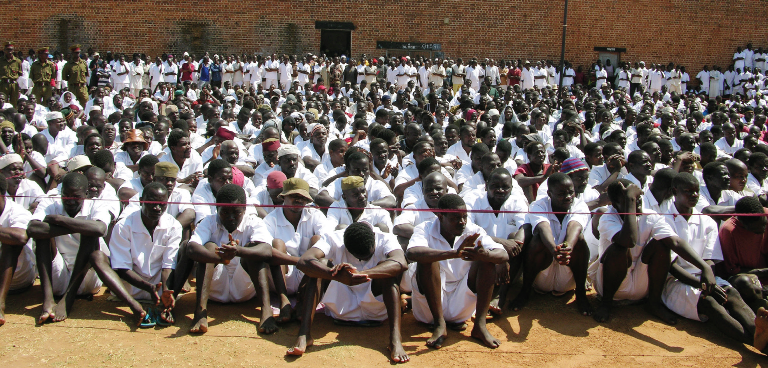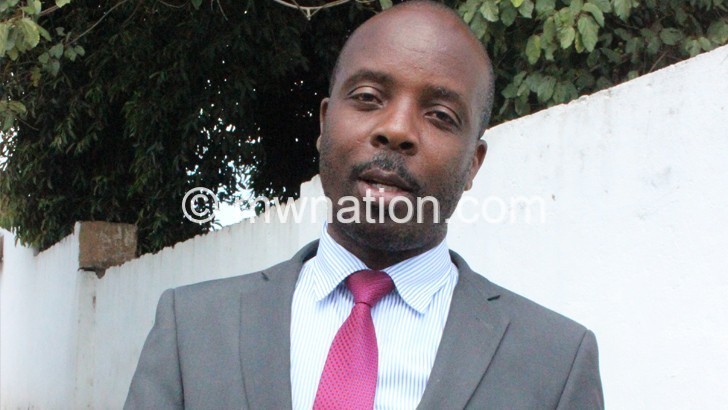The death sentence that is prison diet
As usual, during visiting hours at Maula Prison in Lilongwe, there are inmates loitering inside their open cage. Lucky ones interact with their visitors, of course with an observed distance of about two metres between two, wired fences that separate them from outsiders.
In between the two fences there is a pathway, where a few selected prisoners play a go-between role, visitors have to ask them to invite an inmate they want to talk to. It is also these prisoners who would receive food items from outsiders to hand over to inmates inside.

It is a controlled interaction, such that visitors have to shout on top of their voice to communicate with the inmates, given the distance in between.
Only in heavily negotiated circumstances, usually after a kickback to prisoners in the pathway, you are allowed to talk to an inmate closely.
They are brought in the pathway and then you talk to each other –with just one wired fence in between.
“Njala bwana, Njala ndithandizeni K100 ndigule nthochi [I am hungry boss, please give me a K100 to buy bananas] shouted one prisoner as we talked to the inmate we had come to see.
It is quite common to have inmates ask you for money. But this one was just too persistent to be ignored.
He focused on me and no matter how much I pretended not to see him, he continued to beg for my attention.
I have been at Maula a couple of times to check on a relation who is in jail.
With his insistence and probably my instinct, I felt like meeting the gentleman and I pleaded with the prisoner in the pathway and some prisoner warder if I could talk to him. Luckily my wish was granted.
The prisoner, whose identity we will not reveal for other reasons, did not need to convince me he was sick – he really looked sickly.
“I have been living with HIV for the past 14 years. With the treatment, I have really not had issues with my health. My challenge is the diet and this is why I need your help my brother because someone told me you are a journalist,” narrated the gentleman with his eyes fixed on mine like a wrongdoer begging for forgiveness to avoid a harsh penalty.
It was of no use to interrogate him how he knew I was a journalist, I considered this a call to duty.

His eyes were pale and he generally looked frail and by his own confession he had lost weight “because of the poor diet”.
So, while I thought he just needed some K100, he literally wanted to appeal for help not just for himself but for other inmates who are HIV positive.
“Our biggest problem is the diet. We are thankful that we are given the treatment on time, but the food is not good for our health.
“Eating once a day in our condition doesn’t help and to make matters worse it is the same food every time [nsima and beans]. We need help” the man said.
How Covid-19 has affected inmates with HIV and Aids.
Collaborated interviews, with inmates, warders and organisations that work in prisons, confirmed that while prison diet has always been a big issue in this country, the Covid-19 pandemic has made things worse.
The restrictive Covid-19 measures, which at one point included a stop order for prison visitation, meant that inmates living with HIV and Aids had to survive on one meal a day, a monotonous diet for that matter.
In an interview, national spokesperson Department of Prisons Chimwemwe Shaba conceded that Covid-19 restrictions had an effect on the diet of inmates with HIV and Aids.
He says: “Visitations do help relatives to these inmates to provide supplementary diet. HIV and Aids programmes in prison by different organisations were also affected due to Covid-19 restrictions.”
Southern Africa Networks of Prisons coordinator for Malawi Wisdom Kanyamula said going forward, prison visitations should be exempted should there be future restrictions.
However, he observes that the best way out is to improve the diet in prison because no all have relatives who can bring them supplementary food.
“We believe it is unbecoming for prisoners to be fed by taxpayers’ money. They are able to feed themselves before going to prison and must continue to do so even in prison.
“We are keen to see the Malawi Prison Service acquire capacity to produce food for prisoners by prisoners,” argued Kanyamula.
Actually our findings also show that those prisons that produce their own food, have better diet than those that depend on government and well-wishers.
“Here at Maula we have ever benefited from soya beans grown under Kasungu Prison. We used that to make porridge for inmates living with HIV and Aids.
You visit Byanzi Prison in Dowa—they are self-sufficient; they grow crops, vegetables and rear animals. This is how they manage to have more than a meal a day,” added one senior official in the department.
Centre for Human Rights Education Advice and Assistance executive director Victor Mhango, whose organisation advocates for rights of prisoners, says allowing visitors access to prisons while the pandemic was at the peak “could have been a fatal pursuit”.
He, instead, suggests that there is need to increase funding so that prisons should have food supplements for those with HIV/Aids.
“Underfunding has always contributed to poor diet and with the pandemic there are no notable changes. Prisoners always take same meals [nsima and pigeon peas] and to make matters worse the meal is too soft like porridge and is taken once every 24 hours,” adds Mhango.
According to Kanyamula, they hope that the Malawi Correctional Service Bill, which adequately addressees prisoners’ access to nutrition and HIV services, will be tabled and passed soon.
Malawi has a population of about 14 500 inmates—a number which is over double the designed capacity of prisons. At least about 3800 inmates are said to be living with HIV and Aids.
HIV prevalence in prisons is almost four times the national prevalence rate, meaning prisoners are more at risk.
Information sourced from the Department of Prisons show that in 2020-2021 National budget about K36.7 million was allocated towards HIV and Aids, a figure which has been reduced to about K22 million in the current budget.
Shaba said the reduction is because it is a nine-month budget. This means that every month, the department has about K2.4 million allocated to HIV and Aids activities across all its establishment.





